|
|
|
Sort Order |
|
|
|
Items / Page
|
|
|
|
|
|
|
| Srl | Item |
| 1 |
ID:
184972


|
|
|
|
|
| Summary/Abstract |
In 2005, the United States recognized India as a ‘responsible state with advanced nuclear technology’. How did India go from pariah to a legitimate nuclear state? This article historicizes the concept of nuclear responsibility to explain India's shifting place in the nuclear regime. Existing perspectives view responsibility as a function of discrete state behaviors to the detriment of understanding the relationship between power and responsibility as a discourse. This article tracks the evolving discourse of early proliferators, such as the US, UK and France, who legitimated their possession of nuclear weapons by linking responsibility with deterrence. In its early nuclear history, India challenged these hegemonic perspectives but more recently adopted the deterrence model of responsibility to be granted recognition and legitimacy in the global nuclear regime. The article concludes that nuclear states’ success in linking deterrence with responsibility complicates the place of disarmament as an alternative nuclear responsibility discourse. Tying deterrence to responsibility reshaped the global order around the continual presence of nuclear weapons, narrowing moral agency and limiting a nuclear weapon-free future. Reclaiming responsibility will require moving beyond the typical state-centric politics of blame towards institutional and structural approaches to moral agency.
|
|
|
|
|
|
|
|
|
|
|
|
|
|
|
|
| 2 |
ID:
184968
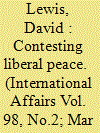

|
|
|
|
|
| Summary/Abstract |
Russia has begun to promote itself internationally as a mediator of conflict and as a ‘peacemaker’. Russian officials cite its extensive experience in managing numerous post-Soviet conflicts and its more recent experience of intervention in civil wars in Syria, Libya, the Central African Republic (CAR) and Nagorno-Karabakh. Russia considers all these activities forms of ‘peacemaking’, but its approach differs radically from the model of liberal peacebuilding that has dominated international practice in the post-Cold War era. It prioritizes authoritarian stability over justice, human rights and democracy and advocates short-term goals of conflict management over long-term goals of conflict resolution. In this article I explain why Russia's norms of peacemaking and conflict management diverged so markedly from liberal peacebuilding norms. I argue that Russia is no longer simply contesting western norms, but developing its own distinct model of conflict management. This model accepts the use of force as an integral element in peacemaking, engages in ‘coercive’ mediation by authoritative actors, and views the West as a geopolitical and normative opponent. This debate over Russia's approach to peace and conflict also offers wider insights into how Russia challenges the norms and practices that underpin the liberal international order.
|
|
|
|
|
|
|
|
|
|
|
|
|
|
|
|
| 3 |
ID:
184967


|
|
|
|
|
| Summary/Abstract |
How do diasporas fight online information wars during armed conflicts in their homelands? I explore this question through interviews with 30 young diaspora Armenians in seven nations about their practical experiences of online activism during the 2020 Karabakh war between Armenia and Azerbaijan. I examine their motivations for engaging in social media activism; strategies and methods of promoting the Armenian narrative; vision of the online opponent; and perceived outcomes of their efforts. Besides investigating this recent case of diaspora mobilization during armed conflict, the study offers broader conclusions about social media and participatory warfare, and about the changing roles of diasporas in international relations. I demonstrate how social media enable participatory war that is transnational, monologic, empowering and retaliatory, involving individual and networked tactics, and culturally and politically transformative. Diasporas, traditionally seen as international agents of lobbying, public diplomacy and material assistance, become important decentralized actors in global conflict infopolitics.
|
|
|
|
|
|
|
|
|
|
|
|
|
|
|
|
| 4 |
ID:
184961
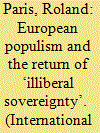

|
|
|
|
|
| Summary/Abstract |
European populist leaders and movements often extol the virtues of sovereignty, but how exactly are they using this term? Scholars have typically relied on conventional understandings of the concept—Westphalian, popular and national sovereignty—to interpret populist discourses, but some have noted that these categories seem inadequate. This article asks whether much older, long overlooked, versions of sovereignty might help to explain the sovereignty discourse of European populists. These older variants include extralegal sovereignty (a leader's power to act outside the constraints of formal rules) and organic sovereignty (the power of a political community understood as a single ‘organism’). Both are inherently illiberal: extralegalism rejects constitutionalism, while organicism is inimical to political pluralism. An examination of the public speeches and statements of one prominent European populist leader, Prime Minister Victor Orbán of Hungary, reveals that he has, indeed, invoked these illiberal versions of sovereignty. By retrieving these older concepts, populists gain a powerful rhetorical tool to advance illiberal principles of political authority.
|
|
|
|
|
|
|
|
|
|
|
|
|
|
|
|
| 5 |
ID:
184952
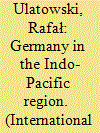

|
|
|
|
|
| Summary/Abstract |
In the twenty-first century, the Indo-Pacific region became the focal point of great power competition. In 2020, Germany published its ‘Policy guidelines for the Indo-Pacific. Germany—Europe—Asia: shaping the twenty-first century together’. The publication of the Indo-Pacific guidelines and the deployment of frigate Bayern to the Indo-Pacific in early August 2021 offer a starting point for a discussion on a German grand strategy in the post-liberal world order. This article argues that the publication of the German Indo-Pacific guidelines and Germany's increased engagement in the region are a consequence of a change in how Germany perceives China. In the first decade of the twenty-first century, the rise of China was seen as an opportunity for Germany, but this has changed, with China now increasingly seen as a threat to Germany's national interests. Consequently, Germany is strengthening its cooperation with like-minded countries in Asia and is engaging in soft balancing against China. Germany's Defence Minister Annegret Kramp-Karrenbauer stops short of using the word alliance, calling for ‘an international network of like-minded countries’ and also stops short of declaring a containment strategy against China, saying that Germany works together with China where this is possible, but digs its heels in against China where it has to.
|
|
|
|
|
|
|
|
|
|
|
|
|
|
|
|
| 6 |
ID:
184971


|
|
|
|
|
| Summary/Abstract |
The battlefields in the contemporary conflicts in the Middle East are multi-level conflicts. They take place in the air and on the ground, but an important and often overlooked dimension of these conflicts is found under the surface. This article recognizes the usefulness of political geography's ‘volumetric turn’ as it examines the use of tunnels in conflict, particularly in the post-2001 conflicts in the Middle East. It asks questions about who uses tunnels, for which purposes and about the impact of tunnels on conflicts. It proceeds to show how tunnels are used by a range of actors (including states, insurgents, civilians and organized crime groups) for various, often overlapping purposes (including offensive, defensive and smuggling/economic purposes). The article argues that tunnels impact on conflicts by benefiting the weaker side in asymmetrical warfare, by directly affecting states’ military strategy, by either generating or challenging political legitimacy and lastly, by becoming central to the economic survival of civilians in conflict. A greater recognition of the subterranean dimension of contemporary Middle Eastern conflicts will provide a more nuanced understanding of the duration, intensity and consequences of these wars.
|
|
|
|
|
|
|
|
|
|
|
|
|
|
|
|
| 7 |
ID:
184963


|
|
|
|
|
| Summary/Abstract |
In their critique of liberal modernity, classical realists theorized its consequence for the heightened sense of insecurity and powerlessness of the individual on the one hand, and the individual's identification with extreme nationalism and violence on the other. This became the challenge posed by liberal modernity in the post-1945 international order. The article argues that the present international order is an extension of the post-1945 order that never resolved this challenge. While the ‘embedded’ form of liberalism that lasted until the early 1970s made social compromises that mitigated the socio-economic insecurities of the individual in liberal modernity, it did not resolve this challenge. The later advancement of neo-liberalism only further intensified it. The article thus critiques existing debates that downplay the challenge of liberal modernity in their analyses of the crisis of the present international order. It concludes that if the present international order is to be put on more stable and peaceful grounds, it requires a more radical break from its post-1945 and post-Bretton Woods past: a break that does not simply call for ‘leadership’ or ‘offshore balancing’ but addresses the psycho-social needs of the individual in liberal modernity.
|
|
|
|
|
|
|
|
|
|
|
|
|
|
|
|
| 8 |
ID:
184962


|
|
|
|
|
| Summary/Abstract |
This article assesses United States President Joe Biden's approach to intelligence. It evaluates his evolving relationship with the Central Intelligence Agency and the rest of the intelligence community from the early 1970s, when he was elected to Congress, to the early 2020s, when he became the forty-sixth president of the United States. It concludes that, against the ever-changing context of international affairs, from the late Cold War to the global ‘war on terror’, Biden's approach to intelligence has remained consistent and stable, showing, on the one hand, enthusiasm for the production of national intelligence, and, on the other, a marked uneasiness about paramilitary covert action and the militarization of intelligence. The discussion that follows speaks to a larger debate, dating to the 1940s and still ongoing, in the executive and legislative branches of government, concerning the purposes and proper use of intelligence. This will interest policy-makers, officials and lawmakers responsible for intelligence and oversight, researchers and practitioners in security and intelligence, and scholars of American foreign relations.
|
|
|
|
|
|
|
|
|
|
|
|
|
|
|
|
| 9 |
ID:
184959


|
|
|
|
|
| Summary/Abstract |
This article contributes to a better understanding of the dynamics of Islamist mobilization in sub-Saharan Africa. Since the late 1980s, several African societies have witnessed significant Islamist violence. Against this background, the article provides a typology of rejectionist Islamism, a strain of Islamism that has left a major imprint both on East and West African settings. While rejectionist Islamist groups share as their common denominator the explicit negation of the nation state's legitimacy, they can be differentiated according to whether they violently challenge the state and are willing to participate in mainstream civil society. Thus, in this article I present four different types of rejectionist Islamism: ‘isolationism’, ‘militant isolationism’, ‘participatory rejectionism’ and ‘militant participatory rejectionism’. Examining rejectionist groups from four African countries, I demonstrate my typology's capacity for facilitating a fine-grained assessment of individual group trajectories over time. Finally, I present findings on the determinants of the violent radicalization of rejectionist Islamist groups.
|
|
|
|
|
|
|
|
|
|
|
|
|
|
|
|
| 10 |
ID:
184956
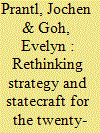

|
|
|
|
|
| Summary/Abstract |
Today's most pressing security and policy challenges—great power conflict, economic interdependence, peacebuilding, climate change and other non-traditional threats such as pandemics—are all complex problems. Hyperconnectivity, power diffusion and radical technological transformation are significantly shrinking the policy space available to governments and other international agencies in what has been called the twenty-first century of complexity. Thus, the practice of statecraft requires accentuated strategic rationale: clear emphasis on big-picture and longer-term purposes and priorities. While effective strategy is essential for mobilizing power and winning strategic contests, effective diplomacy is necessary for garnering support for the strategy. This article contributes to stepping up to this challenge in three innovative ways. First, it utilizes key insights from complex adaptive systems thinking to recast the conceptual underpinnings of power, strategy and statecraft. Second, the article advances a ‘strategic diplomacy’ diagnostic and policy framework to maximize policy space in dealing with complex systems problems in international affairs. And third, by applying the framework to three significant international policy challenges, the article demonstrates the utility and implications of the ‘strategic diplomacy’ framework for strategic policy in the twenty-first century.
|
|
|
|
|
|
|
|
|
|
|
|
|
|
|
|
| 11 |
ID:
184957


|
|
|
|
|
| Summary/Abstract |
The COVID-19 pandemic has forced diplomats to embrace virtual platforms and to learn to combine virtual and physical meetings in their work. In this article, we investigate how this process has taken place and with implications for the conduct of diplomacy. Specifically, we ask how diplomats have adapted to the transition to the virtual medium, what lessons have they learned from this, and how these lessons may inform the conduct of diplomacy in the post-pandemic period? We argue that diplomacy is about to enter a new phase, which we call hybrid diplomacy, in which physical and virtual engagements are expected to integrate, complement and empower each other. We begin by distinguishing between digital adaptation, a forced process brought about by external changes, and digital adoption, a strategic decision by diplomats to use specific technologies towards specific goals. Building on the results of a survey disseminated to 105 diplomats during the pandemic, we then examine how diplomats have adapted to the virtual medium and what challenges they see facing as they transition to the post-pandemic phase. While responders largely agree that virtual interactions are not a good substitute for physical diplomacy, we find strong support for the continued mix of virtual and physical meetings. They enable diplomats to maintain working procedures, collaborate with their peers from around the world, and continue negotiations that began offline. We conclude with a discussion of the technological and social factors that may inform the shape of hybrid diplomacy.
|
|
|
|
|
|
|
|
|
|
|
|
|
|
|
|
| 12 |
ID:
184951
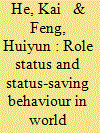

|
|
|
|
|
| Summary/Abstract |
Most research on status in international politics focuses on a state's ‘trait status’, defined by valued attributes that a state possesses, but ignores the importance of ‘role status’, which is constituted through state interactions and competent practices in world politics. By integrating prospect theory and role status scholarship, this article introduces a ‘status-saving’ argument to shed light on how states adopt risk-acceptant strategies to salvage the decline in their role status in world politics. We test the status-saving argument by examining the ASEAN states’ bold community-building efforts in the early 2000s, especially the adoption of the ASEAN Charter in 2007. We argue that both the economic and political conditions of ASEAN were far from mature enough to pursue such an institutionalization and legalization endeavour. The perceived decline of international role status after the 1998 Asian financial crisis, however, encouraged the ASEAN states to take this ‘great leap forward’ behaviour towards regional integration, which has placed ASEAN's long-term status and internal unity in a more risky and vulnerable position. We conclude that pursuing role status is another way for states, especially rising powers, to seek status in a deference hierarchy. Dominant powers should consider accommodating the pursuit of role status by rising powers and encourage ‘do-goodism’ in world politics.
|
|
|
|
|
|
|
|
|
|
|
|
|
|
|
|
| 13 |
ID:
184954


|
|
|
|
|
| Summary/Abstract |
Very little is known about how Indian diplomats have made sense of the change in political power in New Delhi since 2014, when the election of Hindu nationalist Prime Minister Narendra Modi signalled a radical break from the internationalist credo of the Nehruvian Congress establishment. Attending to this gap in knowledge, this article engages with the ongoing debate about the influence of Hindu nationalism on Indian diplomacy, but departs from the conventional emphasis on foreign-policy analysis or Modi's persona. Instead, it centres on the lived experience of career diplomats in the Indian Foreign Service to whom it falls to conduct everyday diplomacy under Hindu nationalist rule. This focus invites a broader question in the global age of populism: how do contemporary diplomatic services adjust to the arrival of nationalist governments? I suggest that the delays in internalization of nationalist norms and diplomatic practices are only partly a function of ideological misalignment between an internationalist bureaucracy and a nationalist government. What matters is also the extent to which the status of the social class represented by the bureaucrats is invalidated by the government's political project. Building its arguments on the back of 85 elite interviews and archival research in India, the article considers changes to diplomatic discourse, protocol, priorities and training, and details how Indian diplomats have adjusted to and resisted Hindu nationalism. It suggests that we study nationalist critiques of ‘cosmopolitan elites’ both as an ideological denunciation of internationalist commitments and as a social rejection of the elites who hold them.
|
|
|
|
|
|
|
|
|
|
|
|
|
|
|
|
| 14 |
ID:
184970


|
|
|
|
|
| Summary/Abstract |
Iran's January 2020 missile attacks on US military bases in Iraq following the assassination of Islamic Revolutionary Guard Corps General Qasem Soleimani correspond to a stark change of Iran's approach. Iran has namely abstained from using its ballistic missile program (BMP), which was only used twice after the 1980–88 Iran–Iraq War: in 2017 and 2018, in both instances in retaliation against ISIS attacks. The article explores the change in Iran's employment of its BMP from a strategic culture perspective while paying special attention to the principles of Shi'a Islam, which form a particular discursive habitat in which Iran's strategic actions are framed and rationalized. Iran's approach to the BMP is thus inseparable from qisas (retaliation), while obeying the overarching principle of maslahat; but also characterized by the varying importance of the the principles zarare aghall, ezterar and nafye sabil. We conclude that a perspective focusing on religious principles can contribute to our understanding of strategic cultural change, in what concerns its possible orientation, range and limits.
|
|
|
|
|
|
|
|
|
|
|
|
|
|
|
|
| 15 |
ID:
184966


|
|
|
|
|
| Summary/Abstract |
In the last two decades, urban insurgencies have become a major concern for scholars and practitioners. It is widely assumed that because half the human population now live in cities in often appalling conditions, it is inevitable that conflict has migrated to cities, not least because urban areas offer would-be insurgents the best opportunity to evade state security forces and their advanced technologies. Demography and asymmetry have been all but universally accepted in the literature as the sole causes of urban insurgency. They are certainly important. Yet, scholars have overlooked a third vital factor: the size of state forces. In the twentieth century, urban insurgencies were common. However, because states commanded very large military forces at that time, insurgents found it very difficult to operate in urban areas. By contrast, as their forces have contracted in the twenty-first century, states have been unable to dominate urban areas, as they typically did in the twentieth century. Consequently, urban enclaves have appeared inside cities from which insurgents have mounted their attacks and contested with state forces.
|
|
|
|
|
|
|
|
|
|
|
|
|
|
|
|
| 16 |
ID:
184965


|
|
|
|
|
| Summary/Abstract |
The last two decades have witnessed a rapid rise in the use, size and capability of many western Special Operations Forces (SOF). A response to the global jihadist threat, the growing presence, prominence and technology-enabled lethality of SOF in conflict zones has resulted in increased scholarly attention. Some have argued that their rise is indicative of important and ongoing changes in the character of war itself. One of the most influential of these works is Steven Niva's study of the transformation of US Joint Special Operations Command (JSOC) Task Forces in Iraq. Niva argues that JSOC (more accurately its Task Force 714 Command Headquarters, henceforth TF714) was forced to adopt a networked organizational structure to counter Al-Qa'ida in Iraq (AQI). For Niva, this transformation provided evidence of a shift towards ‘counter-net’ and ‘chaoplexic’ forms of warfare conceptualized by Bousquet in this journal. This article uses new primary and secondary sources to critique these claims. It argues that although a network approach was an important part of TF714's transformation, it was only one part. Instead, JSOC's transformation is more accurately understood through a post-Fordist industrial framework of the centralization of management control and the simultaneous decentralization of decision-making; the integration of core and periphery forces; outsourcing; and a network approach to knowledge. From this analysis, it argues that post-Fordist, rather than network or chaoplexic theory, best describes even the most networked military organizations in the twenty-first century, and that more broadly, fully networked warfare is unlikely given the frictions associated with the coming ‘binary’ battlefield.
|
|
|
|
|
|
|
|
|
|
|
|
|
|
|
|
| 17 |
ID:
184960
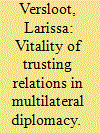

|
|
|
|
|
| Summary/Abstract |
Trust is commonly considered a foundation of multilateral diplomacy. Amidst concerns about eroding trust in this realm, due to a ‘crisis’ of multilateralism and ‘hollowing out’ of diplomacy in a socially distanced world, it is surprising that our knowledge of the role trust plays in everyday multilateral diplomacy remains limited at best. In this article, I explore how trusting relations affect multilateral diplomatic practice. I construct a novel theoretical framework that centres on the notion of ‘vitality’—a useful metaphor to capture the lively character of trusting relations and how they differ in what I call intensity, shape and age. I use this framework to analyse the workings of trust in diplomatic practice, based on empirical material gathered over three years (2018–2021) at the Council of the European Union. Contrary to what is often assumed, I find that trusting relations as such do not unequivocally enable smooth decision-making and can also hinder cooperation. We can understand this, I argue, by grasping the social opportunities and constraints that arise from trust ‘climates’ as constituted by configuring trusting relations. Overall, the analysis unpacks complexities in the connection between trust and cooperation in multilateralism. The analytical vocabulary offered in this article allows both scholars and practitioners to comprehend the manifold ways in which trust matters in multilateral diplomacy.
|
|
|
|
|
|
|
|
|
|
|
|
|
|
|
|
| 18 |
ID:
184953


|
|
|
|
|
| Summary/Abstract |
Against the backdrop of US–China superpower rivalry in the Indo-Pacific, this article assesses the visions and strategies of the region's middle powers, which remain under-examined at present. First, it briefly traces the boundaries of this research by reviewing the contested nature of the Indo-Pacific concept and the definitional complexities of middle power theory. Second, it provides a novel comparative framework to analyse Australia, South Korea and Indonesia as the region's major middle powers, exploring their goals and strategies. The framework consists of: 1) middle power categorization; 2) interconnectedness with the two superpowers; 3) vision for the Indo-Pacific; 4) resulting regional posture; and 5) capacity to implement the country's goals. Third, it assesses the ensuing implications of this analysis for the region's strategic landscape. It finds that Canberra is now firmly aligned with Washington in balancing against China, as epitomized by the Quad and AUKUS; Seoul is cautiously increasing cooperation with the US, though potentially only to protract its strategic ambiguity; and Jakarta is pursuing strategic autonomy for itself and ASEAN, with the ambitious but precarious goal of creating a ‘third way’ for the Indo-Pacific. Consequently, middle powers seem unlikely to provide an alternative platform for the region's direction in the near future, due to a number of internal divisions. By shedding light on such understudied aspects, this article addresses a gap in the scholarly literature and provides a novel contribution to the understanding of both the diverse roles of middle powers and the Indo-Pacific's evolving strategic landscape.
|
|
|
|
|
|
|
|
|
|
|
|
|
|
|
|
| 19 |
ID:
184975


|
|
|
|
|
| Summary/Abstract |
While space, positionality, hierarchy and location have been central undercurrents to understanding women's participation and uptake of the Women, Peace and Security (WPS) agenda, there has been little conceptual clarity about how these dynamics play out in post-conflict settings, nor on the impact that this has on women's civil society networks in these locations. In turn, this silence depoliticizes, decontextualizes and flattens the complex and diverse uses of the WPS agenda in post-conflict settings, as well as the diverse civil society arrangements underpinning this activity. This article makes the issue of space and its political nature central (captured through the use of the ‘politics of scale’), with reference to Iraq as a context for unpacking these dynamics. I explore how Iraqi women participate across different scalar contexts linked to the WPS agenda, and navigate exclusions and opportunities within and across them. Drawing on interviews, speeches and policy material from Iraqi women's organizations and their international partners, I argue that grasping how hierarchies related to scale, identity, resourcing and positionality are reproduced in local and national contexts is vital to understanding the uptake and rewriting of the WPS agenda in post-conflict settings. Further, I explore how Iraqi women's organizations are responding to openings and attempting to challenge the spatial arrangements within and across the different scales they work and participate in.
|
|
|
|
|
|
|
|
|
|
|
|
|
|
|
|
| 20 |
ID:
184974
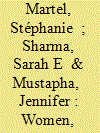

|
|
|
|
|
| Summary/Abstract |
The UN's Women, Peace and Security (WPS) agenda is now over 20 years old, yet much of the Asia–Pacific has been slow to engage in formalized WPS work at national and regional scales. This article examines the relatively recent development of official WPS national action plans by Bangladesh, Indonesia, Japan, the Philippines, South Korea and Timor-Leste, alongside mounting collective efforts towards WPS governance by regional organizations like ASEAN. We demonstrate the existence of an emerging multi-scalar field of WPS discourse and practice in the Asia–Pacific, which is still in its formative stages and carries the potential for both convergence and contestation as actors work to navigate diverse approaches to WPS governance along various ‘tracks’. This article also points to the limitations of a rigidly formalized elite-driven WPS agenda that neglects well-established communities of practice in the Asia–Pacific. Ultimately, more attention needs to be paid to the complex dynamics that shape the ongoing postcolonial encounters between the broader WPS agenda and the localized historical and discursive contexts of regional WPS governance.
|
|
|
|
|
|
|
|
|
|
|
|
|
|
|
|
|
|
|
|
|